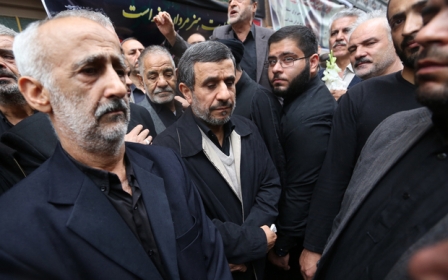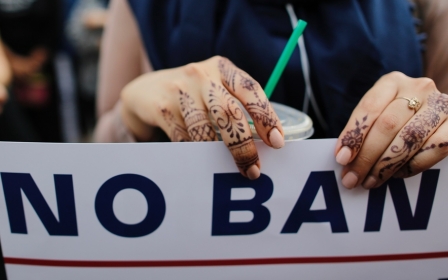Trump administration rejects dozens of Iranian Christian refugee applicants

The US has denied some 100 mostly Christian Iranian refugee applicants who had been waiting for visas in Vienna, an advocacy group and government agencies said.
The rejected Iranians were seeking visas under a US statute that allows Iranians from religious minorities to apply for refugee status under a special category.
"These refugees face the imminent danger of return to Iran, where the already dire situation for religious minorities is steadily deteriorating," said Daniel Mark, chairman of the US Commission on International Religious Freedom, an official government board.
Betsy Fisher, policy director for International Refugee Assistance Project (IRAP), explained that applicants for the Vienna programme start the process while they are in Iran when a family member in the US files the paperwork for them.
After being pre-approved, applicants go to Vienna to complete the last stages of the process. Refugees stay in Vienna a few weeks before receiving their visas, according to Fisher.
These individuals left everything they had in Iran, resigned from any job that they had, sold their homes and their possessions with the expectations that they would be in Vienna for a few weeks.
- Betsy Fisher, IRAP
But the dozens of Iranians who were denied had been in the Austrian capital for more than a year.
“These individuals left everything they had in Iran, resigned from any job that they had, sold their homes and their possessions with the expectations that they would be in Vienna for a few weeks,” Fisher told MEE.
She said the rejection letters did not give the basis for denial or provide them with an alternative to returning to Iran.
All three of President Donald Trump’s travel bans on Muslim-majority countries included Iran.
The US State Department said the "increased denial rate" is not related to Trump’s executive orders, but is due to a stricter vetting process put in place in 2016.
Fisher acknowledged that unexpected delays had started before 2017.
“That being said, the Trump administration is the one that issued these denials… I don’t think the Trump administration can absolve themselves of responsibility by saying these delays started with someone else,” she said.
A State Department official said in an email to MEE that the US will not force denied applicants to return to Iran.
“The United States, the Government of Austria and others are working together on protection options for denied applicants that could include resettlement or asylum elsewhere,” the official said.
Fisher called the effort to find a place for the refugees to stay other than the US and Iran “disingenuous”, saying the State Department could have figured out arrangements before issuing blanket denials.
She said the US government is trying to find “alternative ways to avoid responsibility for a humanitarian crisis of our own making”.
Religious freedoms in Iran
The department did not reveal the number of refugees who were rejected and declined to provide the specific reason for turning them down.
“These individuals were subject to the same rigorous process for resettlement as all refugees and, following input from all relevant departments and agencies, the applications for resettlement were denied,” the US official said.
The co-chairs of the Tom Lantos Human Rights Commission, a bipartisan caucus in the US Congress, voiced "disappointment and concern" about the denial of Iranian refugee applicants and requested the details for the rejected applications.
"These Iranians are members of religious minorities fleeing a regime that has brutally oppressed their communities since 1979," congressmen Randy Hultgren and James McGovern said in a joint statement, referring to the year the Islamic revolution took place in Iran.
Although Iran is an Islamic theocracy, its constitution grants Zoroastrian, Jewish, and Christian citizens the right to worship freely. The law, however, prohibits attempting to proselytise Muslims to a different religion.
Over the past years, rights groups have highlighted a crackdown on Baha’i activists and Christian converts from Islam.
Fisher said if the applicants return to Iran, it will be clear to their government that they were trying to come to the US, which will increase chances of discrimination against them.
Rejecting Iranians claiming to be persecuted by their government appears to be at odds with Trump’s State of the Union pledge to stand “with the people of Iran in their courageous struggle for freedom”.
But the State Department official said: "This administration remains committed to supporting the Iranian people. Since January 2017, over 800 Iranian religious minorities have been approved for admission in the United States through this program and have been successfully resettled in the US."
Middle East Eye propose une couverture et une analyse indépendantes et incomparables du Moyen-Orient, de l’Afrique du Nord et d’autres régions du monde. Pour en savoir plus sur la reprise de ce contenu et les frais qui s’appliquent, veuillez remplir ce formulaire [en anglais]. Pour en savoir plus sur MEE, cliquez ici [en anglais].




